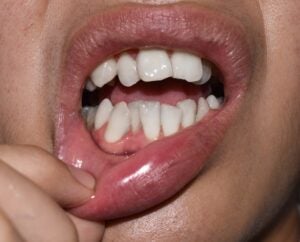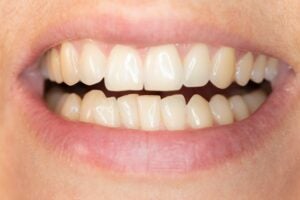-
Detecting Dental Issues Early: The Importance of Regular Checkups
 The Importance of Early Intervention
The Importance of Early InterventionDoes the recommendation of twice yearly checkups seem like overkill to you? It’s not. Regular dental visits give the dentist a chance to become familiar with your mouth, and notice any changes in your oral health. That way, small problems can be addressed before they become major issues. From tooth decay to gum disease, dental issues that are detected early can be managed before they become difficult and expensive to treat. Continue reading “Detecting Dental Issues Early: The Importance of Regular Checkups”
-
The Impact of Stress on Oral Health
 Stress and Your Oral Health
Stress and Your Oral HealthYou probably know that stress can negatively impact your health, with chronic stress manifesting in a wide variety of health conditions. From disturbing your sleep to increasing your risk of heart attack or stroke, the results of poorly managed stress are a problem for your whole body. Did you know that stress also has a negative impact on your oral health? Continue reading “The Impact of Stress on Oral Health”
-
Choosing the Right Toothbrush and Toothpaste
 When it comes to the tools you are choosing to use for your oral hygiene, you want to make sure you select the absolute best. After all, your toothbrush and toothpaste are all you’ve got for cleaning your teeth, mouth, and gums. With so many options available, how do you find the best possible cleaning tools to enhance and clean your beautiful smile? The experts at Park 56 Dental can help you understand what to look for when choosing these important tools. Let’s break it down and examine the criteria you’re looking for.
When it comes to the tools you are choosing to use for your oral hygiene, you want to make sure you select the absolute best. After all, your toothbrush and toothpaste are all you’ve got for cleaning your teeth, mouth, and gums. With so many options available, how do you find the best possible cleaning tools to enhance and clean your beautiful smile? The experts at Park 56 Dental can help you understand what to look for when choosing these important tools. Let’s break it down and examine the criteria you’re looking for.Continue reading “Choosing the Right Toothbrush and Toothpaste”
-
How to Handle Dental Issues When You’re Traveling for the Holidays
 The upcoming holidays are an excellent time to travel, visit family and friends, and relax. But what happens if a dental issue springs up while you’re not at home? This kind of emergency can cause total panic. Are there ways to handle dental issues while you’re traveling? Are there ways to avoid dental problems? Here are some tips on how to handle dental issues while traveling.
The upcoming holidays are an excellent time to travel, visit family and friends, and relax. But what happens if a dental issue springs up while you’re not at home? This kind of emergency can cause total panic. Are there ways to handle dental issues while you’re traveling? Are there ways to avoid dental problems? Here are some tips on how to handle dental issues while traveling.Continue reading “How to Handle Dental Issues When You’re Traveling for the Holidays”
-
Debunking Root Canal Myths
 Root canals get a bad rap. If you need a root canal, you may be filled with worry and have significant concerns regarding the procedure, the pain, and the treatment. Have no fear. The experts at Park 56 Dental are here to dispel the rumors regarding root canals. Getting a root canal may not actually be as bad as you think. Here are some common myths about root canals and the actual benefits of getting one.
Root canals get a bad rap. If you need a root canal, you may be filled with worry and have significant concerns regarding the procedure, the pain, and the treatment. Have no fear. The experts at Park 56 Dental are here to dispel the rumors regarding root canals. Getting a root canal may not actually be as bad as you think. Here are some common myths about root canals and the actual benefits of getting one.Continue reading “Debunking Root Canal Myths”
-
Ways to Freshen Your Breath When You’re On the Go
 You keep your teeth nice and clean and your breath fresh. Maybe you pride yourself in your sparkling smile and fresh breath. However, when you’re away from home or keeping a busy schedule, it can be hard to keep that breath as fresh as you’d like. What are some ways to keep fresh breath on the go? Here are some helpful tips for freshening your breath when you’re on the go.
You keep your teeth nice and clean and your breath fresh. Maybe you pride yourself in your sparkling smile and fresh breath. However, when you’re away from home or keeping a busy schedule, it can be hard to keep that breath as fresh as you’d like. What are some ways to keep fresh breath on the go? Here are some helpful tips for freshening your breath when you’re on the go.Continue reading “Ways to Freshen Your Breath When You’re On the Go”
-
How Crowded Teeth Affect Your Oral Health
The Impact of Crowded Teeth
 If you have teeth that don’t seem to fit into your mouth, it probably makes you feel self-conscious about the way you look. Would it surprise you to learn that crowded teeth can affect more than just your self-esteem? Beyond the aesthetic impact, crowded teeth can lead to an increased risk of tooth decay, excessive wear, speech problems, and even TMJ disorders. Let’s take a look at the effects of crowded teeth, and how you can solve the problem.
If you have teeth that don’t seem to fit into your mouth, it probably makes you feel self-conscious about the way you look. Would it surprise you to learn that crowded teeth can affect more than just your self-esteem? Beyond the aesthetic impact, crowded teeth can lead to an increased risk of tooth decay, excessive wear, speech problems, and even TMJ disorders. Let’s take a look at the effects of crowded teeth, and how you can solve the problem.
Continue reading “How Crowded Teeth Affect Your Oral Health” -
Reasons Why Your Teeth Misalign
The Prevalence of Misaligned Teeth
 If your teeth are misaligned, you are not alone. In fact, about 90 percent of people have at least a little bit of misalignment. Your crooked teeth could be the result of genetics, childhood habits, injuries, tooth loss, or poor oral hygiene. Understanding the causes of misalignment is the first step towards finding a solution for your misaligned teeth, and possibly averting dental complications.
If your teeth are misaligned, you are not alone. In fact, about 90 percent of people have at least a little bit of misalignment. Your crooked teeth could be the result of genetics, childhood habits, injuries, tooth loss, or poor oral hygiene. Understanding the causes of misalignment is the first step towards finding a solution for your misaligned teeth, and possibly averting dental complications.
Continue reading “Reasons Why Your Teeth Misalign” -
The Connection Between Oral Health and Systemic Diseases
The Impact of Oral Health on Your Overall Health
 For years, scientists have been studying the link between oral health and overall health. While research is still ongoing, there are certain connections that are now well-documented. For example, significant associations have been found between periodontal disease and conditions like diabetes, cardiovascular disease, and kidney disease. The common thread linking these diseases is inflammation, and chronic low-level inflammation contributes to oral issues and issues like heart disease, cancer, and cognitive decline. Understanding these connections underscores how important it is to maintain good oral health, in order to promote overall well-being.
For years, scientists have been studying the link between oral health and overall health. While research is still ongoing, there are certain connections that are now well-documented. For example, significant associations have been found between periodontal disease and conditions like diabetes, cardiovascular disease, and kidney disease. The common thread linking these diseases is inflammation, and chronic low-level inflammation contributes to oral issues and issues like heart disease, cancer, and cognitive decline. Understanding these connections underscores how important it is to maintain good oral health, in order to promote overall well-being.
Continue reading “The Connection Between Oral Health and Systemic Diseases” -
Oral Benefits of Saltwater Rinse
Mouthwash or Saltwater?
 Do you use mouthwash? It is effective in freshening breath and cleaning areas you can’t reach by simply brushing and flossing. However, if you want a rinse that addresses a wider array of oral concerns, a saltwater rinse might be a better bet. Saltwater is known for its healing properties, and rinsing with saltwater can even positively impact your respiratory health. Here, we take a look at the benefits of incorporating a saltwater rinse into your oral health routine.
Do you use mouthwash? It is effective in freshening breath and cleaning areas you can’t reach by simply brushing and flossing. However, if you want a rinse that addresses a wider array of oral concerns, a saltwater rinse might be a better bet. Saltwater is known for its healing properties, and rinsing with saltwater can even positively impact your respiratory health. Here, we take a look at the benefits of incorporating a saltwater rinse into your oral health routine.
Continue reading “Oral Benefits of Saltwater Rinse”
RECENT POSTS
categories
- Uncategorized
- Cosmetic Dentistry
- Veneers
- Healthier Teeth
- Teeth Whitening
- Dental Health
- Video
- Dental Emergencies
- Invisalign
- Dental Implants
- Root Canal
- Sedation Dentistry
- Infographic
- Dental Crowns and Bridges
- Dental Anxiety
- Gum Disease
- COVID-19
- Bad Breath
- New York Dentist
- Cut out sugar
- General Dentistry
- Oral Health
- Oral Cancer
- Dry Mouth
- Gum Health
- Toothache
- Dental Sealants
- Cavities



